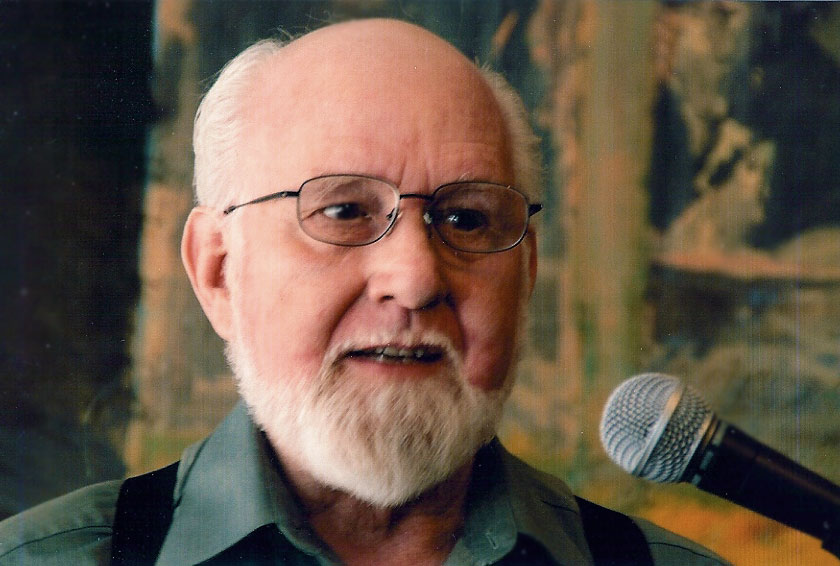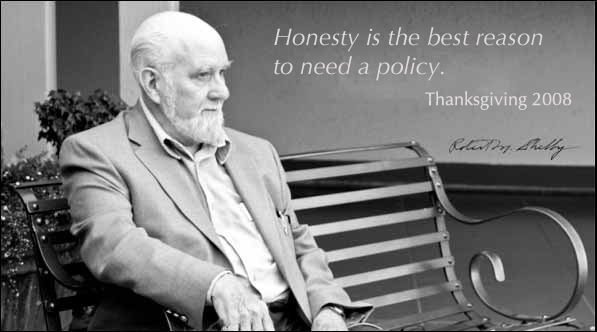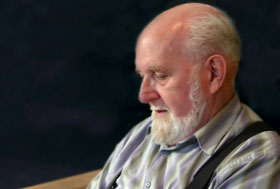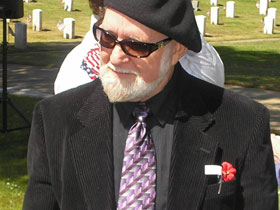Note from Robert's son J. Shelby Sadly, my dad Robert Shelby died of natural causes on the morning of March 15th, 2016. Heartfelt thanks to all who attended the memorial. This website is dedicated to keeping energy around his art. Inquiries welcome. email: jshelby@851musicstudio DOT com. The use of "DOT" is to discourage spam.
Robert M. Shelby, Benicia Poet Laureate Emeritus (2008 - 2010)


at Benicia City Hall.

For BLP's EVERY FIRST TUESDAY anthology.

after reading at Old Army Cemetery.
On Extended Dedication
By late 1957 I had decided that poetry was worthy of a serious person’s life-commitment. I held it higher than making a good living, at which I would seldom do well. I stayed divided over whether I was sensible or not, but made the best use I could of uncertainty and ambivalence, which is: to present readers with no more of either one than will engage them, widen perspective on a work or multiply its interpretive possibilities, its mix of meanings both felt and perceived.
Honesty is less the best policy than clarity, for though honest expression has necessary place in literature, poetry is a creature of indirection, strategem and devious use of foils as in fencing or of invisible partners in conversational dance. Clarity is seldom flat-footed. Clarity opens a vision through vivid image. Vividness, then, approaches devious strategy by merging images, nuances of locution and figures of comparison into complexes beyond easy view or analysis.
The best poetry rewards highly all at once, yet places demand which can be met only by repeated reading in the course of time. Good poetry iridesces in the fullest sense of the word. Iridescence results from laminar residue of many applications of effort that smooth revisions together, losing excess and irrelevance, maximizing verbal efficiency to obtain compression. A well-tuned poem will “diesel” musically, continuing to cycle quietly in some part, or several parts of mind-and-body, evoking fresh aspects of what one knows, or satisfying some need not previously recognized.
Real poetry, then, is deeply medicinal and richly nutritive. Verbal shamans pulse the drums of rhythmic foam and expectation to entrance us, take us out of our limited worlds. Dancing with language, they raise our spirits and expose the lesser states and impulses for what they are, revealing genuine value, illuminating hidden landscape, even in the surroundings and language you previously thought obvious.
Contemporary taste demands responses shaped from immediately experienced aspects and events of personal life, but our lives are so mediated by, and infused with prior literature that much of our experience is plainly vicarious. The task, then, is to construct the best experience-producing devices one can, with some attention to current theories, contemporary works and fads, but not too much. One has to remain, or become, one’s own most formative influence.
R. M. S. (3-13-05/Revised 10-07fm MUSIC FROM THE BONES]
©Robert M. Shelby, site maintained by jwebdevil.com